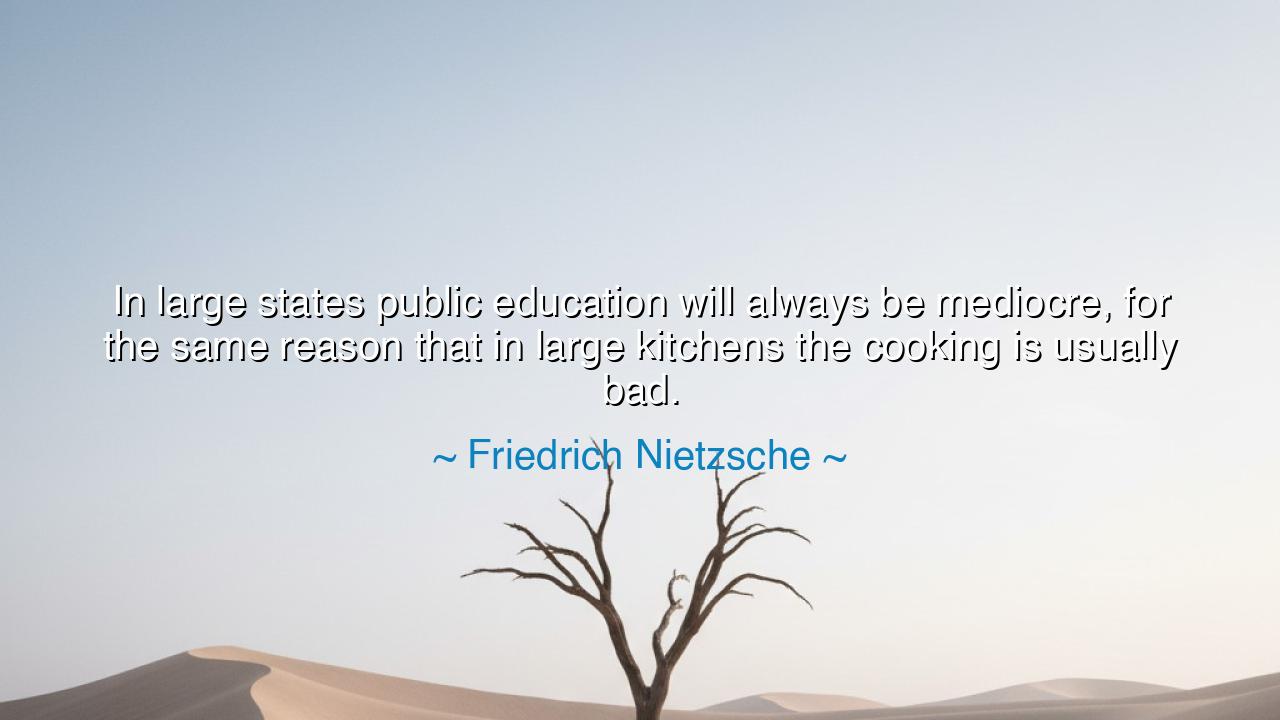
In large states public education will always be mediocre, for the
In large states public education will always be mediocre, for the same reason that in large kitchens the cooking is usually bad.






The philosopher Friedrich Nietzsche, whose words cut through illusion like a sword through mist, once declared: “In large states public education will always be mediocre, for the same reason that in large kitchens the cooking is usually bad.” In this striking metaphor, Nietzsche does not merely speak of schools or meals—he speaks of the nature of greatness, of the peril that comes when the living flame of excellence is smothered by the weight of bureaucracy and conformity. He saw that when a nation grows vast, its institutions—like a pot too large for the fire—lose their flavor, their precision, their art. And so he warns us: where there are too many hands in the pot, both the food and the soul are spoiled.
To understand his meaning, we must remember the world Nietzsche saw. The 19th century was the age of expanding states, of rising empires, and of mass schooling designed not to enlighten, but to standardize. Governments sought to mold citizens into efficient workers, soldiers, and servants of order. Public education, once the domain of philosophers and humanists, became an engine of uniformity. Nietzsche, ever the champion of the individual spirit, rebelled against this trend. He saw in it the death of genius—the flattening of minds, the dulling of souls. For when education is designed to please all, it inspires none; when it feeds the masses, it starves the extraordinary.
Consider his metaphor: the large kitchen. In a small kitchen, the cook knows every ingredient by heart—the texture of the dough, the scent of the herbs, the flame’s proper heat. There is art, care, and attention to the smallest detail. But in a great kitchen filled with servants, orders, and noise, the meal becomes mechanical. Each person follows a recipe, no one follows the heart. The food is sufficient, but never sublime. So it is, Nietzsche tells us, with education in a large state. The teachers, like cooks, obey the recipe handed down by authority. The students, like diners, are fed the same bland dish day after day. The nourishment of the soul becomes routine, and true learning—the kind that awakens fire in the mind—vanishes.
History, too, bears witness to this truth. In the small city-states of ancient Greece, education was a sacred craft. The philosophers of Athens, the poets of Sparta, the mathematicians of Alexandria—each taught in intimate circles, guiding a few minds toward wisdom, not molding multitudes for obedience. Socrates walked among his students, questioning, provoking, awakening. His classroom was the open air, his curriculum the pursuit of truth. But as states grew large, learning became institutional, and the living dialogue between teacher and pupil gave way to regulation, hierarchy, and the dull weight of standardization. The spark of philosophy was replaced by the shadow of bureaucracy.
Nietzsche’s lament is not cynicism—it is prophecy. He foresaw what the modern age has confirmed: that systems built for the masses tend toward mediocrity, because their goal is not excellence but efficiency. Public education in great nations often becomes a mirror of the state itself—vast, impersonal, and fearful of difference. The rare teacher who inspires individuality must fight against the current; the gifted student must learn to preserve his fire amid the gray uniformity of the crowd. Nietzsche’s warning is not to despise education, but to guard its soul—to remember that learning is a sacred encounter between freedom and truth, not a mechanical process of conformity.
We see the same principle in art, in governance, in life itself. Where too many voices dictate, the song loses melody. Where too many rules constrain, creativity withers. The greatness of a small school, a small kitchen, a small state, lies in intimacy—in the care of the particular, in the courage to cultivate uniqueness. The large state, like the large kitchen, serves many but nourishes few. It feeds the body of society but starves its spirit. Thus Nietzsche, with his sharp irony, calls us to remember the difference between feeding and nourishing, between instruction and inspiration.
The lesson is clear: true education cannot be mass-produced. It must be personal, passionate, alive. The teacher must be an artist, not a functionary; the student, an explorer, not a consumer. To heal the mediocrity that Nietzsche decried, we must return to smaller circles of learning, to the cultivation of wonder, to the art of dialogue and mentorship. Whether in great nations or small homes, the flame of wisdom is kept not by the machinery of the state, but by the quiet devotion of those who love truth.
So remember this, O seeker of knowledge: when the kitchen is crowded, withdraw to your own hearth. When the lesson becomes rote, listen for the whisper of your own curiosity. Learn deeply, not broadly; seek understanding, not approval. For greatness, as Nietzsche teaches, is born not from the mass, but from the few—the souls who refuse to be fed on mediocrity, and instead choose to cook their own destiny in the fire of thought.






AAdministratorAdministrator
Welcome, honored guests. Please leave a comment, we will respond soon